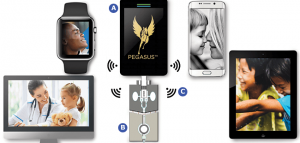Space-Tech Turned Bio-Tech: How UCF Technology Developed for NASA Is Making the Leap to Healthcare
August 31, 2016

The Pegasus device (A) reads the results from the disposable sensor (B) , then connects with GPS to transmit the geolocation of those results through cellular signals (C) to public health agencies and interface with hospital EMRs. Photo: Florida Trend.
As Dr. Vanaja V. Ragavan discovered, help may be closer — and more affordable — than you imagined.
The University of Central Florida’s relationship with healthcare diagnostics startup company Aviana Molecular Technology, LLC (AMT) began with the licensing of sensors developed for NASA by Donald Malocha, Ph.D., Pegasus Professor of Electrical Engineering at UCF. From there, AMT received substantial funding from the Florida Institute for Commercialization of Public Research to commercialize the sensors, and the company is now a tenant at the UCF Business Incubation Program’s tech incubator.
AMT also received an STTR grant from NASA to take these sensors that are currently being conceived for use on vehicles in extra-terrestrial missions and repurpose them as biosensors.
“We plan to expand these sensors into use for monitoring human health,” says Ragavan, president and CEO of AMT. “Right now, a medical test is done for you and sent away to a laboratory. Then you wait. We help the physician or the health care provider make a decision while you’re there.”
She expects the technology will eventually be available for military, space travel, and even veterinary use.
Because these new biosensors are portable, cost-effective and versatile, they can be used in both highly sophisticated health systems and in resource-limited environments where point-of-care diagnosis can positively impact human health.
“Aviana merges the physical sciences and life sciences,” says Andrea Adkins of UCF’s Office of Technology Transfer. “It’s a big success for UCF and for NASA.”
Companies with existing product lines looking for the next technology advancement can search through UCF’s large portfolio of technologies available for licensing, in UCF’s Technology Locator.
Entrepreneurs, like Ragavan, interested in finding tech that can help launch or grow their new enterprise, can browse a subset of the Technology Locator called “Startups, Start Here,” a collection of innovations that are closer to market-ready.
I have worked with many offices of technology transfer around the world,” Ragavan says. “I found UCF to be the most cooperative, the most interested. They’re really interested in commercializing their projects. And they have been really wonderful to work with. I can’t say enough good things about them.”
– This sponsored report was originally published in Florida Trend.